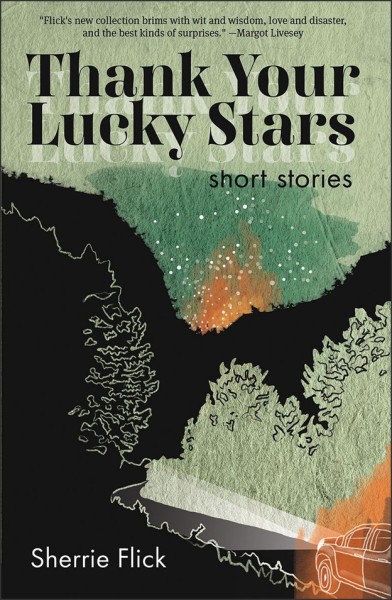
by Cheryl Pappas
Lucky for us, Sherrie Flick has a new collection of stories. Thank Your Lucky Stars (Autumn House Press) comes out in September. If you read flash, you know her name. Flick’s stories have appeared in several anthologies dedicated to flash. She has published a chapbook (I Call This Flirting; Flume Press, 2004), a novel (Reconsidering Happiness; Univ. of Nebraska Press, 2009), and a collection of short stories titled Whiskey, Etc. (Autumn House Press, 2016), which Kathy Fish deemed “a sharp-edged, intelligent, brilliantly written collection of short shorts by a writer at the top of her game.”
In Thank Your Lucky Stars, Flick has arranged 50 stories of varying length—the shortest a paragraph, the longest 21 pages—into four numbered sections. The settings are often suburban towns in the West or Midwest, and Flick uses crickets, birdbaths with calm water, and deer heads as recurrent images throughout to underscore the agonizing quiet of such towns. Most of the stories are about love, but more specifically, finding someone to make a home with. Domestic spaces are the stage, and everyday objects, like two tin coffee cups, resonate with meaning.
Earlier sections contain stories of characters going through that very messy, fumbling search for the right person, moving from house to house, town to town, in the hopes of finally staying put, as exemplified in “Open and Shut.” By the third section, with “Garden Inside,” we see a shift: after leaving one house and its treasured garden, a woman and her husband move into a house with a neglected one and willingly start from scratch. The theme of starting over, already present in the earlier sections, now morphs into transformation. By the fourth section, we see stories about babies, kids, teenagers, a widower. With some exceptions, the book takes us through the stages of growing up, as it were, and finding not a house but a home.
The stories about relationships, on the whole, are about the illusions we wrestle with. “Bottle” begins with a woman cracking open a wine bottle over the edge of the dinner table to get her husband’s attention; she finds breaking things satisfying because he “looked at her then like the first time he’d laid eyes on her.” We see the couple in “Dance” actively trying to avoid pulling away the curtain of a horrific night from their past: Viv spends her day sipping whiskey and martinis on the patio (her drinking companion a deer head she pulls off the den wall), while her husband Matty dutifully serves her and obsessively bakes away his repressions. The “dance” in the title refers to the back and forth of their acquired roles, which they perform unconvincingly, like bad actors in a play. When Matty chastises Viv for her drinking, “You know, y’all shouldn’t be day drinking like losers in here,” Viv snaps back, “There’s just one of me, Matty. Who, may I ask, are you talking about with ‘y’all’?” But they also dance around the truth—one scene tracks the tense moments when they remember the night that a girl was killed and then how they quickly fall back into their agreed-upon forgetfulness.
Other stories in the collection defy a theme at all, like “Caravan, Suburbia,” a three-paragraph tale about a woman spying a mysterious rickety wagon crossing her front yard, and afterwards sensing the “smell of wood smoke, raw upturned earth, the quick scent of passion, and one low, unsung note abandoned in the stray leaves.”
Indeed, there is a range not just in theme. The opening story, “How I Left Ned,” in which a woman stops for corn on the side of the road and makes a dramatic life decision, takes bold leaps in narrative; “House,” however, about a woman who lives alone and peers out the window “like a suspicious widow expecting the worst,” has a slow, meditative pace. I admit, I am drawn to the strangeness and poetry of Flick’s shorter works. The sentences seem to come up from the deep, slowly and patiently, like they’ve been gathered from a Quaker meeting. Her story “Crickets” is just but one example: “They sing like pleasant car alarms again and again. Again and again. In their little black jumpsuits, they take to the crooked sidewalks in droves, not hesitating to leave the flowers and grasses.” Flick marries patience, resonanance, and quality in her flash pieces.
The longer “Still Life,” about a man who plans to end his life, achieves Hemingway-level compression, spanning only one night and the next morning. The story begins mysteriously, with Harry undressing and folding his clothes carefully, tenderly placing them on his bureau. He drinks half a bottle of whiskey. I love that Flick doesn’t reveal what he is up to, not even when she has him walk out the door, at three in the morning, completely naked. We get the middle-of-the-night sights and sounds in poetic prose: “The trees’ silhouetted arms sang hallelujah. The leaves clapped. Harry walked down Maple Street. Dark houses, the faint muffled dog bark, a settling tick tick of a foundation.” I won’t tell you how it ends, but the story continues to offer surprising turns, poetic language, eerie atmosphere, and even humor.
Pre-order Thank Your Lucky Stars from Autumn House Press.
_____________________________
Cheryl Pappas is a writer from Boston. Her fiction and essays have appeared in The Bitter Oleander, Cleaver Magazine, Ploughshares blog, SmokeLong Quarterly, Tin House online, and Essay Daily. She holds an MFA in Fiction from Bennington Writing Seminars. She is currently working on a collection of fables. Her website is cherylpappas.net and you can follow her on Twitter at @fabulistpappas.

 The SmokeLong Grand Micro Contest (The Mikey) is now an annual competition celebrating and compensating the best micro fiction and nonfiction online.
The SmokeLong Grand Micro Contest (The Mikey) is now an annual competition celebrating and compensating the best micro fiction and nonfiction online.